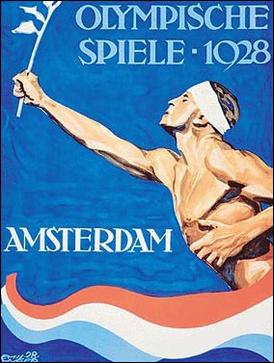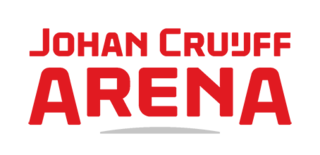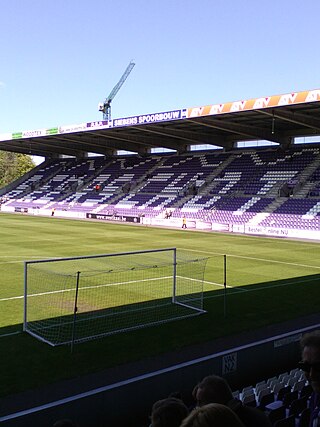
Korfball is a ball sport, with similarities to netball and basketball. It is played by two teams of eight players with four female players and four male players in each team. The objective is to throw a ball into a netless basket that is mounted on a 3.5 m high pole.

The 1928 Summer Olympics, officially the Games of the IX Olympiad, was an international multi-sport event that was celebrated from 28 July to 12 August 1928 in Amsterdam, Netherlands. The city of Amsterdam had previously bid for the 1920 and 1924 Olympic Games. Still, it was obliged to give way to war-torn Antwerp in Belgium for the 1920 Games and Pierre de Coubertin's Paris for the 1924 Games.

The 1920 Summer Olympics, officially known as the Games of the VII Olympiad and commonly known as Antwerp 1920, were an international multi-sport event held in 1920 in Antwerp, Belgium.
The 1928 Summer Olympics saw the third field hockey tournament at Olympics. All games took place either in the new Olympisch Stadion or in the nearby Old Stadion. The field hockey tournament was held in the first part of this Olympic games. All matches were played between Thursday, May 17 and Saturday, May 26, 1928.

The Johan Cruyff Arena is the main stadium of the Dutch capital city of Amsterdam and the home stadium of football club AFC Ajax since its opening. Built from 1993 to 1996 at a cost equivalent to €140 million, it is the largest stadium in the country. The stadium was previously known as the Amsterdam Arena until the 2018–19 football season, when it was officially renamed in honour of Dutch footballer Johan Cruyff who died in 2016.

The Olympic Stadium is a sporting venue which was used as the main stadium for the 1928 Summer Olympics in Amsterdam. The venue is currently used mostly for athletics, other sports events and music concerts.

The Olympisch Stadion or Kielstadion was built as the main stadium for the 1920 Summer Olympics in Antwerp. For those games, it hosted the athletics, equestrian, field hockey, football, gymnastics, modern pentathlon, rugby union, tug of war, weightlifting and korfball (demonstration) events. Following the Olympics it was converted to a football stadium. Its current tenant is K Beerschot VA, a Belgian football club. There are no remnants of the Olympic athletics track.

André Kamperveen Stadium, formerly the National Stadion, is a multi-purpose stadium in Paramaribo, Suriname. Since its opening in 1953, the stadium has been the official home stadium of both football teams S.V. Transvaal and S.V. Robinhood and the official national stadium of the Suriname national football team. With an official capacity of 7,100, it is the largest stadium in Suriname.

Italy competed at the 1920 Summer Olympics in Antwerp, Belgium. 174 competitors, 173 men and 1 woman, took part in 79 events in 18 sports.

Czechoslovakia competed at the 1920 Summer Olympics in Antwerp, Belgium. It was the first time that the nation had competed at the Summer Olympic Games, after the republic was founded in 1918. Previously, Bohemia had competed at the Olympic Games from 1900 to 1912.

The Netherlands competed at the 1920 Summer Olympics in Antwerp, Belgium. 130 competitors, 129 men and 1 woman, took part in 58 events in 15 sports.

The Netherlands was the host nation for the 1928 Summer Olympics in Amsterdam. 266 competitors, 222 men and 44 women, took part in 103 events in 17 sports.

Spain competed at the 1920 Summer Olympics in Antwerp, Belgium. It was only the second appearance of the nation at the Summer Games, after competing in the 1900 Summer Olympics, but missing the Games in 1904, 1908, and 1912. 58 competitors, all men, took part in 29 events in 7 sports.

The 1998 UEFA Champions League final was a football match that took place at the Amsterdam Arena in Amsterdam, on 20 May 1998 to determine the winner of the 1997–98 UEFA Champions League. It pitted Real Madrid of Spain and Juventus of Italy. Juventus appeared in their third consecutive final, while Real Madrid were in their first of the Champions League era. Real Madrid won 1–0, to clinch their record breaking seventh European title, their first title for 32 years. The only goal was scored by Predrag Mijatović. The two teams would face each other in the final again in 2017.
Football is the most popular sport in the Netherlands. Football was introduced to the Netherlands by Pim Mulier in the 19th century when in 1879, at the age of 14, he founded Haarlemsche Football Club. Over the next 30 years, football gained popularity in the Netherlands and the late 1890s and early 1900s saw the foundation of many new clubs, notably Sparta Rotterdam in 1888, which is the oldest professional football club in the country, AFC Ajax in 1900, Feyenoord Rotterdam in 1908, and PSV Eindhoven in 1913.

Korfball was a demonstration sport at the 1928 Olympic Games in Amsterdam. It took place at the Olympic Stadium in Amsterdam at 6 August 1928. It was the second time that korfball was a demonstration sport at the Olympic Games. It was also a demonstration sport at the 1920 Olympic Games in Antwerp.
Throughout their history, the Belgium national team have played at 24 home locations in 12 urban areas, most often in the country's Capital Region, Brussels. The national King Baudouin Stadium, with a capacity of 50,024 people, is the usual playing ground nowadays. At this location, the majority of the Red Devils' home matches took place. Other stadiums are normally assigned as home ground in case a rather small audience is to be expected or when the national stadium is in repair.
During the opening ceremony of the 1928 Summer Olympics, athletes from each country participating in the Olympics paraded into the arena. As Olympic tradition dictates, most participating nations paraded in the alphabetical order of the language of the host country, except Greece, who enters first at the founding nation of the Olympics, and the host country who enters last.













